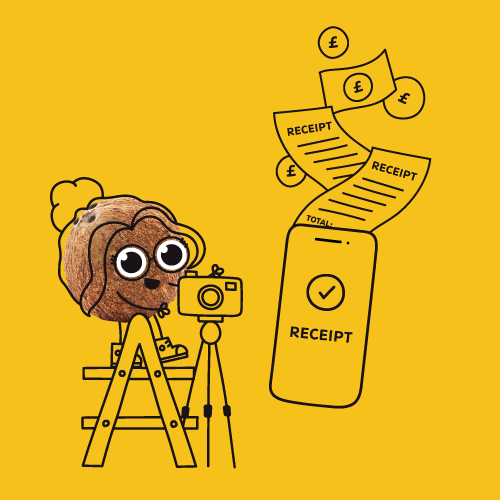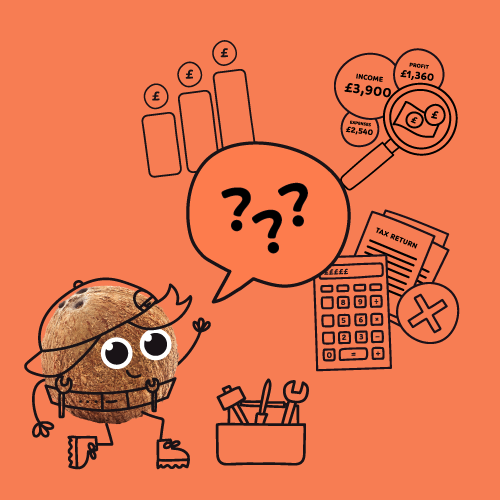I just knew I wanted to be a freelancer—I wanted to be my own boss.
Ironically, it was Katy’s old boss who got her believing she could do it in the first place, by encouraging her (and others) to think about how they could create the life they wanted. And for Katy, that’s definitely meant going freelance.
As SQSP Queen (from the name her clients came up with because of her talents with Squarespace), Katy now spends her days helping small businesses and charities to build websites that have an impact.
You only need to spend a few minutes talking to her to know that she thrives as a freelancer. She’s clearly super-motivated (with lots of sideline projects too) and passionate about helping the people she works for. Yet it’s also clear she can put so much energy into her work because it gives her the lifestyle she craves; living by the sea and having time in her day for wild swimming and surfing.
It’s not about work/life balance so much, because I really don’t mind working hard. It’s more about having the flexibility to choose when I work.
Hello, Katy! Can you tell me a bit about yourself and what you do?
So, my day job is Squarespace web design and training. I use the Squarespace website building tool to make sites for clients and pretty much work exclusively with freelancers, micro-businesses, and charities. It’s probably about 50% charity work and 50% individuals, or small businesses.
Half of what I do is the client web design. And then the other half of my work is training. I do one-to-one training remotely (which I was doing before Covid) and group workshops as well; I prefer to do them in person but I’ve started doing some of those remotely too.
And she’s also got several side projects on the go, including a podcast 99 Problems but a boss ain’t one, an online magazine, and a freelance community she founded; Freelance Folk.
What’s been the end goal of going freelance?
Flexibility. I’ve always had a dream that I could take a month off to go on a surfing holiday. To have the flexibility to dip in and out of the business, so that it ticks over when I’m not there.
So far, freelancing has definitely delivered in that respect, as last year she and her partner were able to move to Anglesey where she now juggles work with her passion for wild swimming and surfing.
If there are good waves, I can just go.
Later in the interview, she even admits to scheduling calls to fit around the high tides, so she can get out for a swim!
Yet, it’s not all about the lifestyle. Katy also speaks with real passion about how she can help her clients and just how dedicated she is to the freelance community of like-minded people she’s built around her—who are vital to making it all work.
For Katy, it’s not necessarily about growing the business or taking on staff. It's about building up a secure base of dedicated clients (“true fans”) so the business can support her life and withstand potential downturns or setbacks (like Covid) in the years ahead.
Being the master of my destiny is probably the main thing.
Where do you go for guidance when it comes to running your business?
My all-time freelance hero is a man called Paul Jarvis. Whatever he writes about I tend to think: how can I apply that to my business?
His book, Company of One has been really helpful to her, as well as the essay 1,000 True Fans; written over ten years ago by Kevin Kelly. It’s since gained traction as a theory about how the internet can allow creative people to build their businesses around a defined number of dedicated “fans” who are their clients.
She also finds the freelance community incredibly helpful; using places like Being Freelance, as well as the community she built herself back when she first started out, Freelance Folk.
What is your business doing differently?
My absolute priority is making sure people feel at ease; they can ask questions and that’s just fine.
She prides herself on making the whole business of creating, owning, and maintaining a website less scary for her clients—many of whom have set up on their own later in life (after corporate careers) and worry they’re “not techy” enough to do it themselves.
What impact has your business had?
I want to save small businesses and charities from really terrible websites!
She’s honest, too. So, if someone comes to her to design their website, but she knows it’d make better business sense for them to do it themselves, then Katy will steer them to one of her training courses instead.
She’d rather do that—give them the skills and confidence to build and maintain their site—than take the money for web design. It’s obvious she gets a lot of satisfaction from helping people in this way, and has great relationships with her clients.
Have you had to diversify your business since Covid-19?
Because Katy was already working remotely, Covid-19 didn’t cause a change in direction but it’s accelerated some things that were already in the pipeline, like creating an online course and getting her magazine project up and running.
I’d actually already set myself up for working remotely when we moved to Anglesey last year. So, I'd already said to my local clients while I lived between Manchester and Sheffield that we were just going to carry on as normal, but we’re going to do it via Zoom instead. So it didn't change radically because of Covid-19. But the main thing for me is to find more ways to connect with people and that’s not just Covid-related. It’s made me seek out communities that I might not have come across before, to get that connection with people.
The lockdown allowed me to create my magazine project, as my work died down for a while—so I had time to set up the website for the new brand, and also set up the magazine.
She’s also started putting together a directory of freelance-friendly spaces, so that when everyone can go out again, they can easily find good local places to work and hang out.
What advice would you give to anyone starting a business now?
Start something and don’t wait until it’s perfect to let it out on the world.
Especially now, when you may find you’ve got more time on your hands, she’s a great advocate of just getting it out there, rather than endlessly tweaking. Her advice is to get your idea seen sooner rather than later, so you can quickly find out if it’s a viable business.
So, what was your life like before you started working for yourself?
Putting exercise and health on my calendar is like a new thing for me. It used to be an afterthought, but now it’s a priority.
In the years before she’d turned freelance, Katy had suffered at times from anxiety at work, but freelancing has made all the difference to that; being her own boss and in charge of how she spends her time seems to have been completely liberating. Now she has her own rules that work for her: like never starting work before 10:30am, and she books time out in her calendar for when the tide is high so she can get a swim in—but she can also work long days that stretch late in the evening.
The point is, it’s her choice.

How has freelancing added to your life?
I’ve learned so much more while freelancing than I did through the rest of my career.
It’s evident from talking to Katy that it’s not just the lifestyle. She’s also met “some really cool people, and other kindred spirits who don’t fit into the employee box”.
Katy’s learned so much from having to do a little bit of everything, but makes a big effort to reach out and support others in the freelance community too. Back when she was in Manchester, she’d even set up a group so that freelancers who were missing the Friday-vibe you get in an office could meet up in person on Friday afternoons.
In fact, when asked about the three biggest challenges she’s faced, the first one is isolation:
I actually thought I'd really enjoy running my business, working from home all by myself.
As part of my previous job, I used to have to go to corporate networking events and I hated it. So I was like, yes, I can’t stand people! I'm so excited to be at home behind my computer! But then, after about six months, I started to crave that human connection and I missed bouncing ideas off people.
The second big challenge has been cash flow. Only in the last year has Katy felt she could pay herself a set amount each month—rather than have a salary that fluctuates from month to month, depending on her busy/quiet periods. She knows she’s lucky to have a partner who, when she started out, had a salaried job and that definitely helped at the beginning.
And the third challenge, which is still a work in progress, is to find the time to create content to grow her audience and reach more people.
What do you wish you’d known when you started out?
Really keen to pass on what she’s learned, Katy fixed on these things in particular:
- Don’t feel you need to listen to everyone.
- Find the people who are living their lives (and conducting their businesses) in the way that you’d like to yourself. Then look at what they’re saying.
- Find the voices that matter to you and tune out the other ones.
Also, ask for help.
There are so many lovely freelance communities out there, so join them.
Talking to Katy, it’s blindingly obvious that if anyone was born to be a freelancer, it’s her!
She puts the hours in working at something she knows she’s good at (“Squarespace could be my specialist subject on Mastermind!”) and evidently gets a lot of satisfaction from being able to help her clients.
And this supports a lifestyle that she and her partner chose to create for themselves, which makes the most of living in one of the most beautiful coastal locations.










